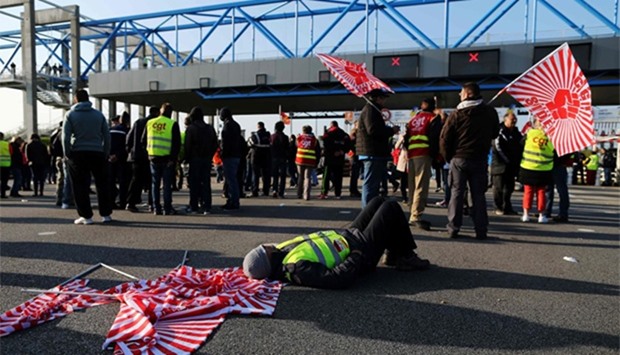With two weeks until France hosts the Euro 2016 football championships, the country has been paralysed by a series of transport strikes and fuel shortages that has heaped pressure on the deeply unpopular Socialist government.
Unions have called for fresh rallies in cities across France on Thursday, the latest bout of social unrest that started around three months ago and has frequently turned violent.
Under-fire Prime Minister Manuel Valls said while the labour law would not be withdrawn, it might still be possible to make ‘changes’ or ‘improvements’.
On Wednesday, he had lashed out at the CGT union that is driving the protests, stressing that they did ‘not make the law in France.’
In fresh comments on Thursday, he branded the union ‘irresponsible’ and again said it could not ‘impose legislation.’
Long queues formed at petrol stations with some introducing rationing as the pumps ran dry amid a prolonged blockade of refineries and depots by CGT activists.
And with around a third of petrol stations running dry or dangerously low on supplies, attention turned to nuclear power stations that provide three quarters of France's electricity.
All but three of the country's 19 power stations have voted to down tools, the CGT said, adding that this would not necessarily affect electricity supply immediately.
But a nuclear power plant in Nogent-sur-Seine, around 100 kilometres (60 miles) southeast of Paris, is already operating at just 25 percent capacity.
The government has been forced to tap into its strategic reserves that last nearly four months and President Francois Hollande has vowed to do ‘everything... to ensure the French people and the economy is supplied’.
One oil refinery out of the country's eight returned to operation Wednesday but five others are still either halted or have reduced production.
Worried drivers were turning in droves to online apps to find petrol stations that still had fuel.
- 1968 and all that -
The labour market reforms are designed to make it easier for companies to hire and fire workers which many organisations including the International Monetary Fund have said is crucial to pep up the ailing economy.
But unions are demanding the reforms be scrapped altogether, seeing them as too pro-business and unlikely to bring down high unemployment.
The government forced the controversial legislation through parliament earlier this month without a vote, further infuriating the protesters.
Unions say they have popular support for the protests and they were cheered by a poll carried out on Thursday that showed nearly two-thirds of people approved the actions.
Viviane, a 66-year-old pensioner queueing to fill up her car in Allier, central France, on Wednesday said the situation reminded her of May 1968, when students and workers paralysed the country for two weeks in protest at president Charles de Gaulle's government.
‘I remember May '68 and I can tell you the shortages were no joke so I am taking precautions,’ she said.
But in some rare good news for the government on Wednesday, figures showed a 0.6 percent dip in the number of unemployed in April -- the first time the jobless roll has shrunk for two consecutive months in the past five years.
Labour Minister Myriam El Khomri attributed the drop to government incentives to boost hiring.

